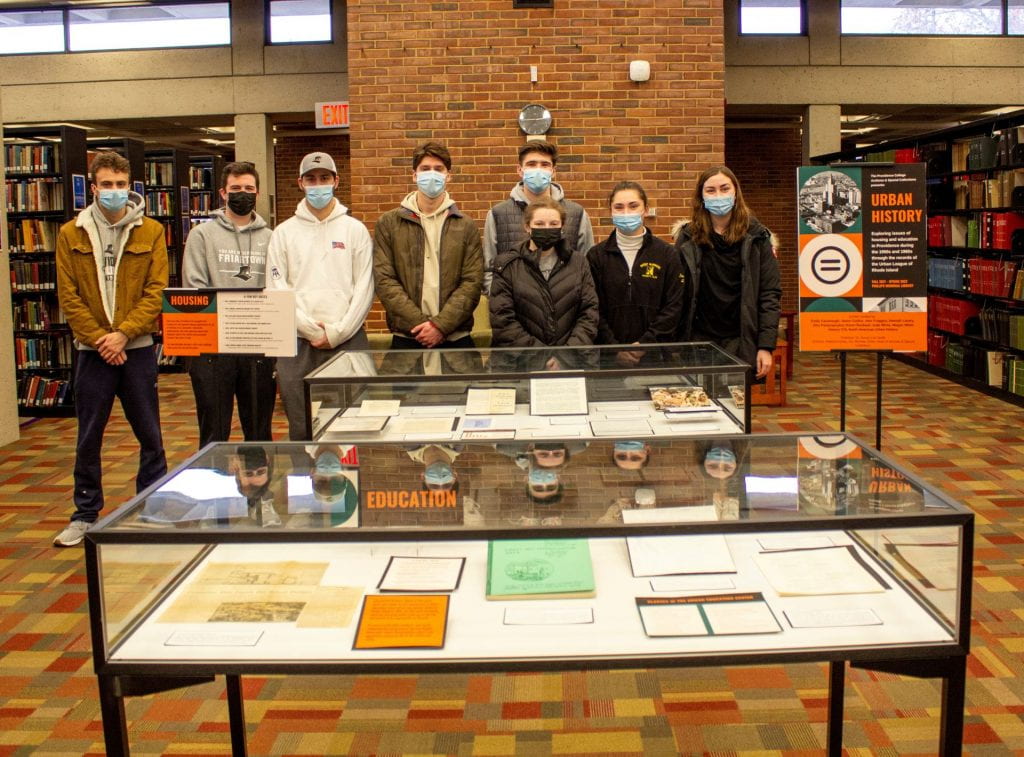March 24, 2022
History students curate exhibit on urban housing and education
By Maeve Hickey ’21, ’22G
As part of the Urban History course in the fall 2021 semester, Providence College history students participated in an unconventional research project — a completely student-curated exhibit, centered on urban housing and education in Providence during the 1950s and 1960s.
The exhibit is on display at Phillips Memorial Library through April.
All documents in the exhibit were pulled from the Providence College Archives. For the semester-long project, students performed their own background research before diving into the archives and handpicking items they wanted to feature .
Dr. Steven Carl Smith, associate professor of history, was the course instructor, but Michelle Chiles, head of archives and special collections at PC, was the students’ main point of contact for the project and archives liaison.
The exhibit features records from the Urban League of Rhode Island. The Urban League is a community-based organization that has worked to improve opportunities for marginalized and underrepresented community members, working in city government, local agencies, and schools with a mission to eliminate racial discrimination in Rhode Island. In the 1950s and 1960s, its mission focused specifically on the injustices of racial segregation in the state.
The class was split into two groups. One group focused on the education portion of the project, and the other focused on housing.

Hannah Lavery ’22 (North Attleboro, Mass.), a biology major with a history minor, worked on the education portion of the exhibit. She said the project kept her more engaged through the semester than a traditional research paper would have. Digging through Providence’s history continuously taught her new things.
“I grew up 20 minutes away from here and my grandmother grew up in Providence, and I had never heard of the Urban League until we started our research,” said Lavery.
Lavery also learned a little about her ancestry. While looking at documents in the archives, she noticed one was signed by a distant relative. The document was for the approval of the Career Education Center in Providence. Lavery found out her relative was a member of the committee that approved and investigated the center. In addition to that discovery, she found all the archival information to be memorable.
“It’s different than reading a scanned version of a document,” said Lavery. “You can actually feel how old it is, smell how old it is, and it just makes the experience that much more special.”
Lavery’s favorite was a meticulously hand-drawn poster made for the Providence Career Education Center. Lavery found the piece while looking through the collection boxes, and she and the team instantly knew it needed to be included in the exhibit.

Alexander Panacopoulos ’23 (Lynn, Mass.), a history major, contributed to the housing portion of the exhibit. Panacopoulos hopes to have a career involving history and felt that curating the exhibit gave him a taste of the daily life of a historian.
“Being a history major, going through the archives and curating the exhibit gave me what felt like my first glimpse into what my future career could look like,” said Panacopoulos.
Both students agreed that the collaborative nature of the project was more fulfilling than a traditional research paper and were overwhelmed with pride once they saw the project come to fruition.
“Walking in and seeing my name on something I contributed to was an unbelievable feeling,” said Lavery.
The archives and other departments at the college hope to do more student-curated exhibits, which provide a more hands-on experience than traditional class projects.
Chiles sees more such opportunities for engaged learning and hopes exhibits like this will help promote the use of PC’s archives throughout campus.
With the refreshed John E. Fogarty Reading Room on the second floor of the library, the archives staff is excited to work with a variety of classes on student research and other projects.
“Completing the exhibit took just as much researching and preparation as a traditional project, but as a student, sometimes it can feel like you don’t get a lot out of doing a research paper,” said Chiles. “When you get to see the physical substance of your work, and share it with others, the reward is much more tangible.”




